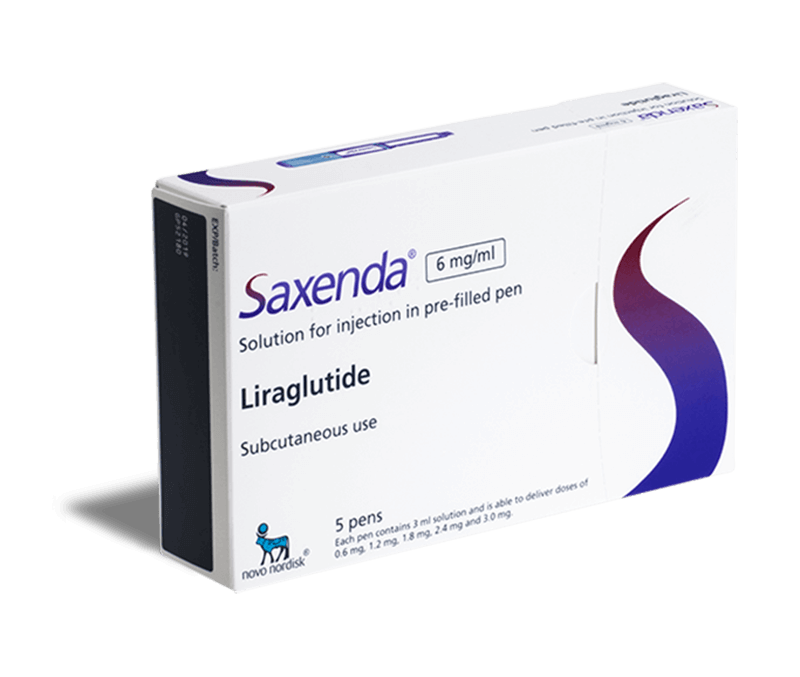
Τι είναι το Saxenda;
Πριν από την ερώτηση “Πού να αγοράσετε το Saxenda online στην Ελλάδα;”, χρειάζονται περισσότερες πληροφορίες για το φάρμακο. Το Saxenda είναι μια θεραπεία απώλειας βάρους που μπορεί να βοηθήσει τους ενήλικες να χάσουν βάρος όταν συνδυάζεται με μια δίαιτα χαμηλών θερμίδων και ένα πρόγραμμα άσκησης. Εάν έχετε ΔΜΣ 30 ή περισσότερο και αγωνίζεστε να χάσετε και να διατηρήσετε το βάρος σας, οι ενέσεις Saxenda μπορεί να είναι κατάλληλες για εσάς. Σας βοηθούν να αισθάνεστε πιο χορτάτοι, γεγονός που μπορεί να σας βοηθήσει να τρώτε λιγότερο και να μειώσετε την πρόσληψη θερμίδων, γεγονός που σας κάνει να χάσετε βάρος και μπορεί να σας βοηθήσει να το διατηρήσετε.
*Το Saxenda θα είναι σύντομα διαθέσιμο από το συνεργαζόμενο φαρμακείο μας. Εν τω μεταξύ, υπάρχει ένα εξίσου αποτελεσματικό υποκατάστατο. Για να επωφεληθείτε πλήρως από το συμπλήρωμα διατροφής, συνιστάται η χρήση του για τουλάχιστον 3 μήνες.
Πώς λειτουργεί η λιραγλουτίδη στο Saxenda για την απώλεια βάρους;
Το δραστικό συστατικό του Saxenda είναι η λιραγλουτίδη, ένα φάρμακο που μοιάζει με μια φυσική ορμόνη στο σώμα σας που ονομάζεται GLP-1 (glucagon-like peptide-1). Το GLP-1 δημιουργείται στο πεπτικό σας σύστημα μετά από ένα γεύμα. Πρόκειται για μια ορμόνη που λέει στο σώμα σας ότι έχετε χορτάσει και βοηθά στη ρύθμιση της πείνας σας. Δημιουργώντας ένα παρόμοιο αποτέλεσμα με το GLP-1, η λιραγλουτίδη συμβάλλει στη μείωση της όρεξής σας και σας κάνει να αισθάνεστε πιο χορτάτοι, γεγονός που μπορεί να σας οδηγήσει στην κατανάλωση λιγότερων θερμίδων και, επομένως, στην απώλεια βάρους. Σε συνδυασμό με μια δίαιτα χαμηλών θερμίδων και τακτική άσκηση, η θεραπεία αυτή μπορεί να σας βοηθήσει να χάσετε βάρος και να το διατηρήσετε.
Πώς να χρησιμοποιήσετε το Saxenda για απώλεια βάρους
Όταν παραλάβετε την πένα Saxenda, θα συνοδεύεται από επίσημες οδηγίες χρήσης που θα σας ενημερώνουν λεπτομερώς για τον τρόπο χρήσης αυτής της θεραπείας. Ωστόσο, θα σας πούμε επίσης τι πρέπει να κάνετε για να πάρετε αυτό το φάρμακο, ώστε να μπορείτε να λάβετε μια ενημερωμένη απόφαση σχετικά με την ιατρική σας θεραπεία.
Λαμβάνετε το Saxenda χρησιμοποιώντας την πένα στην οποία είναι συσκευασμένο για να εγχύσετε μια δόση μία φορά την ημέρα. Μπορείτε να χορηγήσετε τη δόση σας οποιαδήποτε στιγμή της ημέρας, με ή χωρίς φαγητό, ώστε να μπορείτε να επιλέξετε πότε θα έχετε το μεγαλύτερο όφελος από αυτή τη θεραπεία. Για να κάνετε την ένεση, πρέπει να ακολουθήσετε τα εξής βήματα:

- Στάδιο 1 –, Ελέγξτε ότι το διάλυμα στην πένα είναι διαυγές, μην χρησιμοποιείτε την πένα εάν το διάλυμα είναι θολό. Ανοίξτε προσεκτικά μια νέα βελόνα NovoTwist και τοποθετήστε την στο στυλό, περιστρέφοντάς την μέχρι να ακούσετε ένα κλικ για να ασφαλίσει στη θέση της, στη συνέχεια αφαιρέστε το καπάκι της βελόνας και φυλάξτε το για αργότερα, μπορείτε να πετάξετε το εσωτερικό καπάκι της βελόνας.
- Βήμα 2 –, Εάν χρησιμοποιείτε νέα πένα, ελέγξτε τη ροή περιστρέφοντας τον επιλογέα δόσης μέχρι να εμφανιστεί το σύμβολο ελέγχου της ροής. Κρατήστε το στυλό με τη βελόνα προς τα πάνω και πατήστε το κουμπί δόσης μέχρι ο μετρητής να επιστρέψει στο 0. Εάν η πένα λειτουργεί σωστά, θα πρέπει να δείτε μια σταγόνα διαλύματος στην άκρη της βελόνας, εάν όχι, δοκιμάστε ξανά έως και 6 φορές. Εάν το στυλό εξακολουθεί να μην λειτουργεί, χρησιμοποιήστε ένα νέο στυλό.
- Βήμα 3 –, Γυρίστε τον επιλογέα δόσης μέχρι ο μετρητής να δείξει τη δόση που χρειάζεστε (π.χ. 0,6 για δόση 0,6 mg).
- Βήμα 4 –, Εισάγετε τη βελόνα στο δέρμα σας, φροντίζοντας να βλέπετε καθαρά τον μετρητή δόσεων. Πατήστε και κρατήστε πατημένο το κουμπί δόσης μέχρι ο μετρητής να δείξει 0, στη συνέχεια κρατήστε τη βελόνα στο δέρμα και μετρήστε αργά μέχρι το 6 πριν αφαιρέσετε τη βελόνα.
- Βήμα 5 –, Χρησιμοποιήστε το εξωτερικό καπάκι της βελόνας για να ξεβιδώσετε με ασφάλεια τη βελόνα από το στυλό και απορρίψτε την προσεκτικά. Επανατοποθετήστε το καπάκι του στυλό για να προστατεύσετε το διάλυμα από το φως μεταξύ των χρήσεων.
Ποια είναι τα σημεία ένεσης για αυτό το προϊόν;
Τα καλύτερα σημεία για την ένεση Saxenda είναι το μπροστινό μέρος της μέσης σας, το μπροστινό μέρος των μηρών σας ή το άνω μέρος του βραχίονα. Δεν θα πρέπει να κάνετε ένεση του διαλύματος σε φλέβα ή μυ, η θεραπεία έχει σχεδιαστεί για να εγχέεται κάτω από το δέρμα και πουθενά αλλού. Εάν δεν είστε σίγουροι για το πού πρέπει να κάνετε την ένεση, ζητήστε από τον συνταγογράφο σας να σας δείξει περισσότερες λεπτομέρειες.
Ποια είναι η συνήθης δόση του Saxenda;
Η ημερήσια δόση του Saxenda θα αυξηθεί σε διάστημα 5 εβδομάδων, με κάθε δόση να χορηγείται μία φορά την ημέρα και όχι περισσότερο. Θα πρέπει να ακολουθείτε τις οδηγίες δοσολογίας που σας έδωσε ο συνταγογράφος σας, αλλά οι συνήθεις ποσότητες που θα χρησιμοποιήσετε είναι οι ακόλουθες:
Εβδομάδα – Ημερήσια δόση
- Εβδομάδα 1: 0,6 mg μία φορά την ημέρα
- Εβδομάδα 2: 1,2 mg μία φορά την ημέρα
- Εβδομάδα 3: 1,8 mg μία φορά την ημέρα
- Εβδομάδα 4: 2,4 mg μία φορά την ημέρα
- Εβδομάδα 5: 3mg μία φορά την ημέρα
Πόσες πένες θα χρειαστώ για να ολοκληρώσω τη δόση μου;
Όταν αρχίσετε να αγοράζετε το Saxenda online στην Ελλάδα, ο αριθμός των στυλό που θα χρειαστείτε για να ολοκληρώσετε τη δόση σας εξαρτάται από την ποσότητα του φαρμάκου που παίρνετε κάθε μέρα. Τα παρακάτω προγράμματα θα σας ενημερώσουν για το πόσα στυλό θα χρειαστείτε τον πρώτο μήνα και πώς θα τα χρησιμοποιήσετε.

Πότε δεν πρέπει να χρησιμοποιείται αυτό το προϊόν;
Το Saxenda δεν είναι κατάλληλο για παιδιά κάτω των 18 ετών ή ενήλικες άνω των 75 ετών. Μην χρησιμοποιείτε αυτό το προϊόν εάν είστε αλλεργικοί στη λιραγλουτίδη ή σε οποιοδήποτε άλλο από τα συστατικά που αναφέρονται. Ποτέ μην μοιράζεστε την πένα Saxenda με κανέναν άλλον, ακόμη και αν έχετε αλλάξει τη βελόνα της πένας. Η κοινή χρήση ενός στυλό μπορεί να οδηγήσει σε σοβαρές λοιμώξεις ή στη μετάδοση σοβαρών ασθενειών. Μην χρησιμοποιείτε αυτό το προϊόν εάν έχετε :
- Σοβαρή καρδιακή ανεπάρκεια
- ένα σοβαρό πρόβλημα του στομάχου ή του εντέρου που οδηγεί σε καθυστερημένη κένωση του στομάχου, που ονομάζεται επίσης γαστροπάρεση
Φλεγμονώδης νόσος του εντέρου.
Συμβουλευτείτε το γιατρό σας πριν αγοράσετε το Saxenda χωρίς ιατρική συνταγή στην Ελλάδα εάν:
- έχουν νεφρικά προβλήματα ή υποβάλλονται σε αιμοκάθαρση
- έχετε ηπατικά προβλήματα
- έχετε διαβήτη. Δεν πρέπει να χρησιμοποιείτε το Saxenda για να αντικαταστήσετε την ινσουλίνη.
- Έχετε έντονο πόνο στην άνω κοιλιακή χώρα, ιδίως στη δεξιά πλευρά κάτω από τα πλευρά. Εάν χάσετε πολύ βάρος, μπορεί να εμφανίσετε χολόλιθους και φλεγμονή της χοληδόχου κύστης.
- Έχετε νόσο του θυρεοειδούς, συμπεριλαμβανομένων των θυρεοειδικών όζων και του διογκωμένου θυρεοειδούς αδένα.
Έχετε ταχυπαλμία ή αισθάνεστε την καρδιά σας να χτυπάει γρήγορα σε κατάσταση ηρεμίας όταν παίρνετε αυτό το προϊόν.
να αφυδατωθείτε, καθώς αυτή η θεραπεία μπορεί να σας προκαλέσει απώλεια σωματικών υγρών.
Το Saxenda έχει παρενέργειες;
Όπως όλα τα φάρμακα, έτσι και οι ενέσεις Saxenda μπορεί να έχουν παρενέργειες, οι οποίες όμως δεν παρουσιάζονται σε όλους. Εάν παρουσιάσετε οποιαδήποτε από τις ακόλουθες σοβαρές ανεπιθύμητες ενέργειες κατά τη λήψη της λιραγλουτίδης, θα πρέπει να αναζητήσετε άμεση ιατρική βοήθεια:
- Συμπτώματα σοβαρής αλλεργικής αντίδρασης, όπως δυσκολία στην αναπνοή ή στην κατάποση, πρήξιμο του προσώπου, του στόματος, της γλώσσας ή του λαιμού, ταχυκαρδία.
- Συμπτώματα παγκρεατίτιδας, π.χ. έντονος και επίμονος πόνος στο στομάχι, ο οποίος μπορεί να επεκταθεί στην πλάτη, αίσθημα αδιαθεσίας.
Συνήθεις παρενέργειες που μπορεί να αντιμετωπίσετε είναι:
- Αίσθημα αδιαθεσίας, αδιαθεσία, διάρροια ή δυσκοιλιότητα – αυτές οι επιπτώσεις συνήθως εξαφανίζονται μέσα σε λίγες ημέρες ή εβδομάδες.
- Προβλήματα στομάχου και εντέρου, π.χ. δυσπεψία, φλεγμονή του βλεννογόνου του στομάχου, στομαχικές ενοχλήσεις, πόνος στο άνω μέρος του στομάχου, καούρα, φούσκωμα, μετεωρισμός, ρέψιμο, ξηροστομία.
- Αίσθημα αδυναμίας ή κούρασης
- Αλλαγή στην αίσθηση της γεύσης
- Αίσθημα ζάλης
- Δυσκολία στον ύπνο, αϋπνία
- Χολόλιθοι
- Αντιδράσεις στο σημείο όπου κάνατε την ένεση, π.χ. μώλωπες, ερεθισμός, κνησμός, εξάνθημα.
- Υπογλυκαιμία με αποτέλεσμα συμπτώματα όπως κρύος ιδρώτας, χλωμό και κρύο δέρμα, πονοκέφαλος, αυξημένος καρδιακός ρυθμός, αίσθημα αδιαθεσίας, αίσθημα πείνας, αλλαγή στην όραση, υπνηλία, αδυναμία, νευρικότητα, άγχος, σύγχυση, δυσκολία συγκέντρωσης, τρόμος.
- Αύξηση των παγκρεατικών ενζύμων, π.χ. λιπάση, αμυλάση.
Για έναν πλήρη κατάλογο των πιθανών ανεπιθύμητων ενεργειών αυτού του προϊόντος, ανατρέξτε στο φύλλο οδηγιών χρήσης που συνοδεύει το φάρμακό σας. Εάν εμφανίσετε αυτές ή οποιεσδήποτε άλλες ανεπιθύμητες ενέργειες, θα πρέπει να ενημερώσετε αμέσως τον συνταγογράφο, τον γιατρό ή τον φαρμακοποιό σας.
Η διακοπή του Saxenda προκαλεί παρενέργειες;
Προς το παρόν δεν υπάρχουν γνωστές παρενέργειες από τη διακοπή των ενέσεων απώλειας βάρους Saxenda. Ωστόσο, θα πρέπει να διακόψετε τη λήψη αυτής της θεραπείας μόνο εάν ο συνταγογράφος, ο γιατρός ή ο φαρμακοποιός σας σας έχει πει να το κάνετε. Θα σας βοηθήσουν να προετοιμαστείτε για τη διακοπή της θεραπείας σας με τον αποτελεσματικότερο δυνατό τρόπο.
Πώς να αποθηκεύσετε αυτό το προϊόν
Πριν χρησιμοποιήσετε κάθε στυλό Saxenda για πρώτη φορά, θα πρέπει να φυλάσσεται στο ψυγείο σε θερμοκρασία 2-8°C. Μην καταψύχετε. Αφού αρχίσετε να χρησιμοποιείτε το στυλό, μπορείτε να το αποθηκεύσετε για 1 μήνα σε θερμοκρασία κάτω των 30°C. Μπορείτε να συνεχίσετε να αποθηκεύετε το στυλό στο ψυγείο, αν το επιθυμείτε. Όταν δεν χρησιμοποιείτε το στυλό σας, βάλτε το καπάκι στο στυλό για να το προστατέψετε από το φως.

Μην χρησιμοποιείτε αυτό το προϊόν εάν έχει παρέλθει η ημερομηνία λήξης που αναγράφεται στην αρχική συσκευασία. Φυλάξτε το μακριά από τα μάτια και την πρόσβαση των παιδιών. Όταν τελειώσετε τη χρήση του στυλό σας ή αν έχει περάσει ένας μήνας από την πρώτη φορά που το χρησιμοποιήσατε, πετάξτε το με ασφάλεια, χρησιμοποιώντας τα δοχεία αιχμηρών αντικειμένων για τις βελόνες, αν είναι απαραίτητο. Εάν δεν είστε σίγουροι για τον τρόπο ασφαλούς απόρριψης αυτού του προϊόντος, μιλήστε με τον φαρμακοποιό σας και ζητήστε συμβουλές. Οι φαρμακοποιοί μπορούν επίσης να διαθέσουν με ασφάλεια και υπευθυνότητα τυχόν αχρησιμοποίητα φάρμακα.
Χρειάζομαι ιατρική συνταγή για να αγοράσω το Saxenda online;
Χρειάζεστε ιατρική συνταγή για να αγοράσετε το Saxenda στην Ελλάδα φθηνά. Οι συνεργαζόμενοι επαγγελματίες υγείας μπορούν να σας χορηγήσουν συνταγές, εάν πιστεύουν ότι αυτή η θεραπεία είναι κατάλληλη για εσάς και την κατάστασή σας. Όταν κάνετε κλικ στο “Δείτε την τιμή του Saxenda Στην κορυφή αυτής της σελίδας θα δείτε ένα σύντομο ερωτηματολόγιο από μια ομάδα υγειονομικής περίθαλψης που θα τη βοηθήσει να κατανοήσει τις ανάγκες σας για την υγεία.
Ακριβώς όπως σε μια προσωπική διαβούλευση με τον γενικό σας ιατρό, οι συνταγογράφοι θα αξιολογήσουν τις απαντήσεις σας στις ερωτήσεις τους και θα γράψουν μια συνταγή για τη θεραπεία που θεωρούν ότι είναι η καλύτερη για εσάς. Στη συνέχεια, μπορείτε να πληρώσετε για το φάρμακό σας και θα το στείλουν γρήγορα και διακριτικά συσκευασμένο.
FaQ σχετικά με την αγορά Saxenda στην Ελλάδα
Μπορώ να χρησιμοποιήσω το στυλό αδυνατίσματος;
Η πένα απώλειας βάρους Saxenda πρέπει να χρησιμοποιείται μόνο από ενήλικες άνω των 18 ετών με ΔΜΣ (δείκτη μάζας σώματος) 30 ή περισσότερο και οι οποίοι ανήκουν στην κατηγορία των παχύσαρκων. Μπορεί επίσης να χρησιμοποιηθεί από ενήλικες με ΔΜΣ μεταξύ 27 και 30, οι οποίοι έχουν προβλήματα υγείας που σχετίζονται με το βάρος, όπως διαβήτη, υψηλή αρτηριακή πίεση ή αποφρακτική άπνοια ύπνου (πάθηση που προκαλεί αναπνευστικά προβλήματα κατά τη διάρκεια του ύπνου).
Εάν δεν ανήκετε σε καμία από αυτές τις κατηγορίες, το φάρμακο αυτό δεν συνιστάται για εσάς και δεν πρέπει να προσπαθήσετε να το χρησιμοποιήσετε για την απώλεια βάρους. Εάν δεν είστε σίγουροι για τον ΔΜΣ σας, μπορείτε να χρησιμοποιήσετε τον παρακάτω υπολογιστή μας ή τον υπολογιστή ΔΜΣ του NHS, ο οποίος θα σας ζητήσει το ύψος, το βάρος και άλλες πληροφορίες για να υπολογίσει τον ΔΜΣ σας.
Θα πρέπει να αλλάξω τη διατροφή μου όταν χρησιμοποιώ αυτές τις ενέσεις απώλειας βάρους;
Θα πρέπει να ακολουθήσετε μια δίαιτα χαμηλών θερμίδων και να ασκείστε περισσότερο κατά τη διάρκεια της λήψης των ενέσεων απώλειας βάρους Saxenda. Ο γιατρός σας θα είναι σε θέση να σας παράσχει ένα πρόγραμμα διατροφής και άσκησης που θα πρέπει να ακολουθήσετε παράλληλα με τις ενέσεις απώλειας βάρους, το οποίο θα σας βοηθήσει να αξιοποιήσετε στο έπακρο τη θεραπεία σας. Αυτό το πρόγραμμα όχι μόνο θα λειτουργήσει παράλληλα με τη θεραπεία απώλειας βάρους, αλλά θα σας βοηθήσει να κάνετε αλλαγές στον τρόπο ζωής σας και να αναπτύξετε καλές συνήθειες που θα σας βοηθήσουν να διατηρήσετε την απώλεια βάρους σας μετά τη θεραπεία σας.
Πόσο βάρος μπορείτε να χάσετε με το Saxenda;
Η ποσότητα βάρους που μπορείτε να χάσετε με το Saxenda εξαρτάται από τις προσωπικές σας συνθήκες. Πρώτον, το αρχικό σας βάρος θα παίξει ρόλο στο πόσα κιλά μπορείτε να χάσετε, όπως και η τρέχουσα διατροφή σας και το πρόγραμμα άσκησης. Όταν αρχίσετε να παίρνετε λιραγλουτίδη, ο συνταγογράφος σας θα καταγράψει το αρχικό σας βάρος και θα το χρησιμοποιήσει για να παρακολουθήσει την πρόοδό σας κατά τη διάρκεια των πρώτων 12 εβδομάδων της θεραπείας.
Εάν έχετε αυξήσει την ημερήσια δόση σας σε 3 mg λιραγλουτίδης αλλά δεν έχετε χάσει τουλάχιστον 5% του σωματικού σας βάρους κατά τη διάρκεια αυτού του χρόνου, αυτές οι ενέσεις δεν είναι πιθανώς η κατάλληλη θεραπεία απώλειας βάρους για εσάς. Έχοντας αυτό κατά νου, μπορείτε να προσδιορίσετε ότι, εάν αυτή η θεραπεία λειτουργεί για εσάς, θα χάσετε συνήθως τουλάχιστον 5% του αρχικού σωματικού σας βάρους εντός 12 εβδομάδων από την αύξηση στη μέγιστη ημερήσια δόση των 3 mg την ημέρα.
Εάν ανησυχείτε για την ποσότητα βάρους που χάνετε ενώ παίρνετε αυτό το φάρμακο, θα πρέπει να μιλήσετε με τον συνταγογράφο, τον γιατρό ή τον φαρμακοποιό σας και να ζητήσετε συμβουλές.
Μπορώ να χρησιμοποιήσω ένα φάρμακο για την απώλεια βάρους εάν είμαι έγκυος ή θηλάζω;
Δεν πρέπει να αγοράσετε το στυλό Saxenda χωρίς ιατρική συνταγή στην Ελλάδα εάν είστε έγκυος ή θηλάζετε. Αυτή η θεραπεία μπορεί να επηρεάσει το μωρό σας, οπότε εάν ήδη λαμβάνετε αυτό το προϊόν θα πρέπει να ζητήσετε από το γιατρό ή το συνταγογράφο σας να διακόψει τη θεραπεία σας πριν προσπαθήσετε να μείνετε έγκυος. Προς το παρόν δεν είναι γνωστό εάν τα συστατικά αυτού του προϊόντος μπορούν να περάσουν στο μητρικό γάλα, επομένως δεν θα πρέπει να το χρησιμοποιείτε κατά τη διάρκεια του θηλασμού, καθώς μπορεί να αποτελέσει κίνδυνο για το μωρό σας.
Μπορώ να αγοράσω το Saxenda online στην Ελλάδα εάν είμαι διαβητικός;
Θα πρέπει να ενημερώσετε το γιατρό σας ότι έχετε διαβήτη πριν αγοράσετε το Saxenda online στην Ελλάδα για πρώτη φορά. Μπορεί να μπορέσετε να χρησιμοποιήσετε αυτό το προϊόν για να χάσετε βάρος, αλλά ο συνταγογράφος σας μπορεί να χρειαστεί να προσαρμόσει τη δόση των φαρμάκων για το διαβήτη σας.
Καθώς αυτές οι ενέσεις επηρεάζουν τα επίπεδα σακχάρου στο αίμα σας, η φαρμακευτική σας αγωγή θα πρέπει να διαχειρίζεται προσεκτικά για να αποφευχθεί η υπερβολική μείωση των επιπέδων σακχάρου στο αίμα σας. Εάν ο συνταγογράφος σας συμφωνεί ότι το Saxenda είναι κατάλληλο για εσάς, θα πρέπει να φροντίσετε να μην αναμειγνύετε τα ενέσιμα φάρμακά σας και να βεβαιωθείτε ότι δεν το χρησιμοποιείτε με αγωνιστές των υποδοχέων GLP-1, όπως η εξενατίδη και η λιξισενατίδη.
Ποια είναι η τιμή του Saxenda στην Ελλάδα;
- Για 1 στυλό Saxenda, η τιμή είναι: 144,70€
- Για 2 στυλό από τη Saxenda, η τιμή είναι: 246.90€
- Για 3 στυλό από τη Saxenda, η τιμή είναι: 349,90€
- Για 4 στυλό από τη Saxenda, η τιμή είναι: 436.50€
- Για 5 στυλό από τη Saxenda, η τιμή είναι: 521,70€ ( Εξοικονομείτε 200€ )
